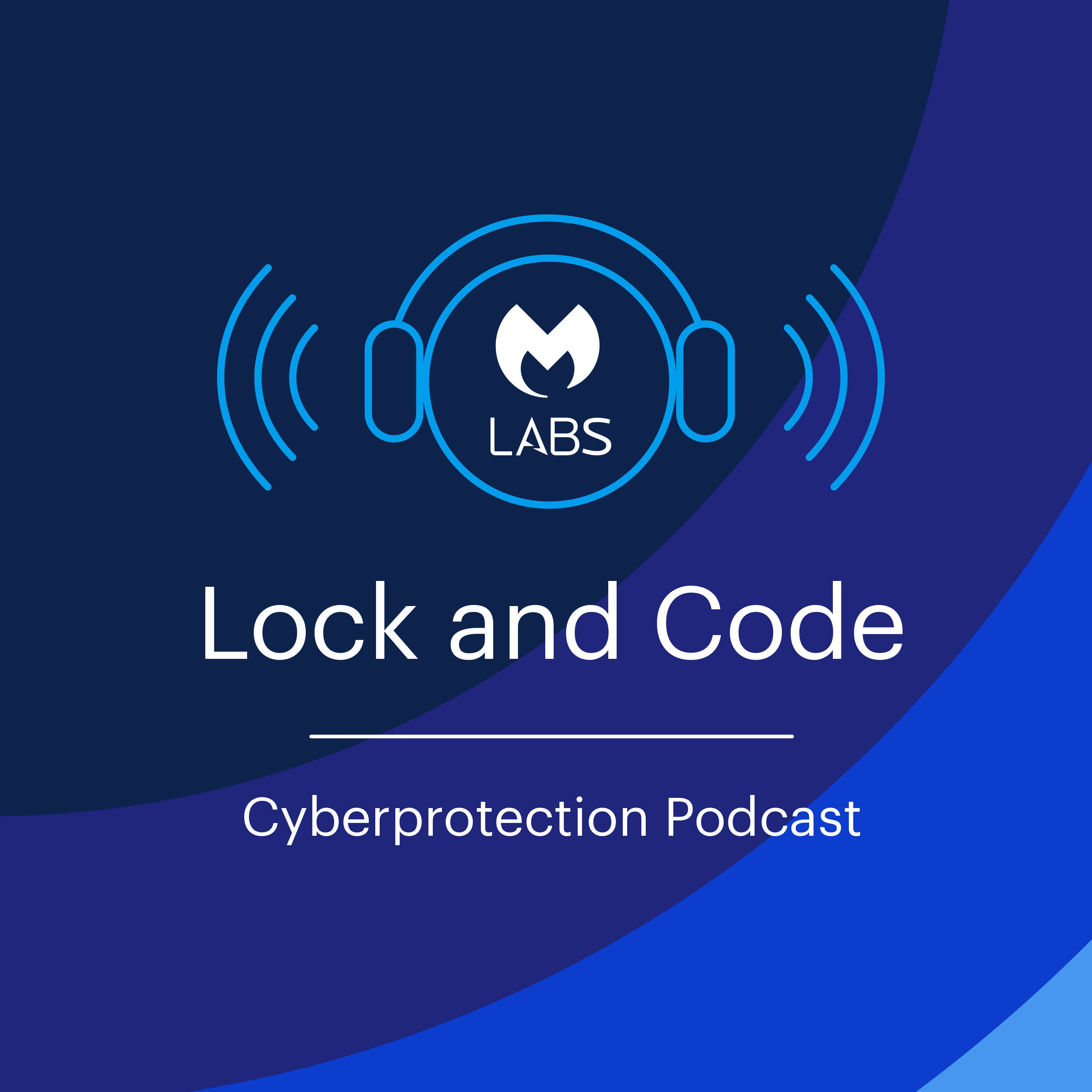
Lock and Code
Lock and Code tells the human stories within cybersecurity, privacy, and technology. Rogue robot vacuums, hacked farm tractors, and catastrophic software vulnerabilities—it’s all here.
- Update frequency
- every 14 days
- Average duration
- 41 minutes
- Episodes
- 142
- Years Active
- 2020 - 2025

Have we lost the fight for data privacy?
At the end of 2021, Lock and Code invited the folks behind our news-driven cybersecurity and online privacy blog, Malwarebytes Labs, to discuss what upset them most about cybersecurity in the year pr…

Roe v. Wade: How the cops can use your data
On June 24, that Constitutional right to choose to have an abortion was removed by the Supreme Court, and immediately, this legal story became one of data privacy. Today, countless individuals ask th…

When good-faith hacking gets people arrested, with Harley Geiger
When Lock and Code host David Ruiz talks to hackers—especially good-faith hackers who want to dutifully report any vulnerabilities they uncover in their day-to-day work—he often hears about one speci…

Securing the software supply chain, with Kim Lewandowski
At the start of the global coronavirus pandemic, nearly everyone was forced to learn about the "supply chain." Immediate stockpiling by an alarmed (and from a smaller share, opportunistic) public led…

Tor’s (security) role in the future of the Internet, with Alec Muffett
Tor, which stands for "The Onion Router," has a storied reputation in the world of online privacy, but on today's episode of Lock and Code with host David Ruiz, we speak with security researcher Alec…

Hunting down your data with Whitney Merrill
Last year, Whitney Merrill wanted to know just how much information the company Clubhouse had on her, even though she wasn't a user. After many weeks of, at first, non-responses, she learned that her…

Recovering from romance scams with Cindy Liebes
Earlier this year, a flashy documentary premiered on Netflix that shed light onto on often-ignored cybercrime—a romance scam. In this documentary, called The Tinder Swindler, the central scam artist …

Why software has so many vulnerabilities, with Tanya Janca
Every few months, a basic but damaging flaw is revealed in a common piece of software, or a common tool used in many types of programs, and the public will be left asking: What is going on with how o…

Why data protection and privacy are not the same, and why that matters
Data protection, believe it or not, is not synonymous with privacy, or even data privacy. But around the world, countless members of the public often innocently misconstrue these three topics with on…

Telling important stories securely, with Runa Sandvik
In 2017, a former NSA contractor was arrested for allegedly leaking an internal report to the online news outlet The Intercept. To verify the report itself, a journalist for The Intercept sent an ima…

De-Googling Carey Parker’s (and your) life
Three years ago, a journalist for Gizmodo removed five of the biggest tech companies from her life—restricting her from using services and hardware developed or owned by Google, Apple, Amazon, Facebo…

How Crisis Text Line crossed the line in the public’s mind
How would you feel if the words you wrote to someone while in a crisis—maybe you were suicidal, maybe you were newly homeless, maybe you were suffering from emotional abuse at home—were later used t…

The world’s most coveted spyware, Pegasus
Two years ago, the FBI reportedly purchased a copy of the world's most coveted spyware, a tool that can remotely and silently crack into Androids and iPhones without leaving a trace, spilling device…

How a few PhD students revealed that phishing trainings might just not work
You've likely fallen for it before—a simulated test sent by your own company to determine whether its employees are vulnerable to one of the most pernicious online threats today: Phishing.
Those simu…

Why we don’t patch, with Jess Dodson
In 2017, the largest ransomware attack ever recorded hit the world, infecting more than 230,000 computers across more than 150 countries in just 24 hours. And it could have been solved with a patch …

What angered us most about cybersecurity in 2021
We are only days into 2022, which means what better time for a 2021 retrospective? But rather than looking at the biggest cyberattacks of last year—which we already did—or the most surprising—like we…

Everything you always wanted to know about NFTs (but were too afraid to ask)
In August, the NFT for a cartoon rock sold for $1.3 million, and ever since then, much of the world has been asking: What the heck is going on?
On today's episode of Lock and Code, with host David Ru…

Why Macs are the best, according to Mac expert Thomas Reed
In 2021, the war for computer superiority has a clear winner, and it is the Macintosh, by Apple. The company's Pro laptops are finally, belatedly equipped with ports that have been standard in other …

The Internet is not safe enough for women, and Sue Krautbauer has some ideas about why
Cyberstalking. Harassment. Stalkerware. Nonconsensual pornography, real and digitally altered. The Internet can be a particularly ugly place for women.
On Lock and Code this week, we ask why. Join a …

Why we fail at getting the cybersecurity basics right, with Jess Dodson
The cybersecurity basics should be just that—basic. Easy to do, agreed-upon, and adopted at a near 100 percent rate by companies and organizations everywhere, right?
You'd hope. But the reality is t…